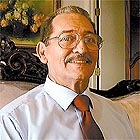|
 |
|
Esta página no está disponible en español. Orlando SentinelPuerto Rican Veterans Gain Respect With FilmBy Walter PachecoJanuary 27, 2002
Remembered. ---------- (PHOTOS: NATIONAL GUARD FOUNDATION) A Puerto Rican regiment is being recognized in a documentary for its heroic efforts during the Korean War after more than a half-century of near obscurity. Noemi Figueroa Soulet, who is producing the film in New York, is in the Orlando area to interview veterans of the 65th Infantry, which is well-known on the island but not in the States. She came to Orlando because the region is known for its burgeoning Puerto Rican population. "The unique experience of the only all-Hispanic unit in [U.S.]military history was my inspiration for this film. These men were second-class citizens, who could not vote but still had to go to war. Many did not even speak English," Soulet said. "They were thrust to serve a country they knew little about, yet fought to the end to defend it." Islanders, although U.S. citizens, cannot vote for the president. Carlos Ruiz Gaudin, 70, a Company B rifleman with the 65th Infantry, tells stories of bone-chilling weather and "chinitis" -- a word the troops coined to describe their fear of the Chinese division in Korea.
QUOTE: 'There were moments when you were just too scared to raise your head for fear you'd be killed by the Chinese.' Carlos Ruíz Gaudín
"There were moments when you were just too scared to raise your head for fear you'd be killed by the Chinese," Gaudin said. "Only our families know these stories, and they are the ones that keep them alive for us." The U.S. Army organized the 65th Infantry Regiment in 1899, a year after Spain ceded Puerto Rico to the United States. In the 1950s it was dubbed "Borinqueneers" after the Indian tribe of Puerto Rico. The military brass also referred to the unit as the "rum and Coke" outfit. Although the soldiers initially were drafted solely for the defense of the island, they later would serve in World War I and II. However, it was during the Korean War that the soldiers of the 65th Infantry proved that they were no fizzy cocktail, but a heroic and worthy regiment. Gaudin remembers suffering a nasty spell of frostbite that nearly killed him while defending his post. "I had lost my glove while I was standing guard at my post. Suddenly, I couldn't feel my hand, arms, and later, my entire body. All I could do was move my eyes -- I was frozen," Gaudin said. He remained in a makeshift hospital recovering for two weeks before he was sent back to the battlefield. Other soldiers faced deadlier enemies than frostbite. In one battle in Seoul, the soldiers fought for three days, then charged into the fray with fixed bayonets and forced out a Chinese division. They also were instrumental in protecting the U.S. Marines after a failed attack in North Korea. That battle was captured in a 1992 painting commissioned by the National Guard Foundation. A lesser-known and controversial incident resulted in the courts-martial of several men of the regiment after they were accused of abandoning their posts. "These men considered this battle a suicide mission and refused to fight. After the court-martial, all the sentences were remitted, and they were honorably discharged," Figueroa Soulet said. 'Amazing stories' However, much of this history remains unrecorded. "Many of these veterans have amazing stories about how they survived before and after the war, yet you can't find any of that in our history books," said Maggie Rivas-Rodriguez, an assistant journalism professor at the University of Texas at Austin who is researching the social and cultural impact of Hispanic military men from the 1920s to post-Korean War America. "The lack of Latino scholars accounts for the little research done on Hispanics in the military," Rivas-Rodriguez added. "There is a real urgency to capture the history of these veterans." Many of the surviving veterans from the regiment are in advancing years, and few remain to tell their stories. Gaudin himself is ailing from diabetes and cirrhosis of the liver. "I may not be in the best of health, but I get around. It is very important to me that other people will know what happened to us during the Korean War," Gaudin said. "We have much to tell." Honor at Arlington A few years ago, the regiment was honored with a plaque at Arlington National Cemetery. "Many of the members of the 65th Infantry Regiment received Silver Stars and Purple Hearts for their bravery and service in the U.S. military," said Rep. Jose Serrano, D-N.Y., during the Arlington ceremony. "It is so important that we recognize their contributions and include them in the history that is taught in our schools so that young people can learn about their accomplishments."
|

 ----------
----------